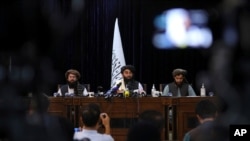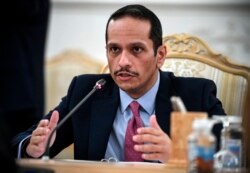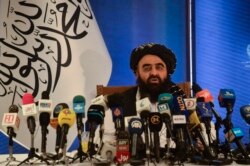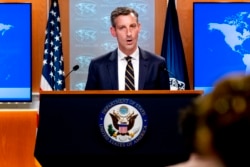The Qatar foreign minister said Wednesday the issue of recognizing the Taliban government in Afghanistan is currently not a priority, but the global community “now is inline” with helping the war-ravaged country deal with growing humanitarian and economic challenges.
Sheikh Mohammed bin Abdulrahman Al Thani told an international conference in the Qatari capital, Doha, the Taliban “is a de facto power” in Afghanistan and isolating the country would be a “big mistake” because it would mean punishing the Afghan people for something they didn’t commit.
“We cannot just wait for steps to be taken by the Taliban, and then we react to these steps,” Al Thani said while speaking at the Global Security Forum. “I believe the international community has a responsibility to direct those steps and to have a clear roadmap in dealing with the situation,” he added.
Heads of government and foreign ministers from the world’s 20 leading economies, the G-20, agreed Tuesday at a video gathering hosted by Italy to look at ways to inject more cash into Afghanistan to help tackle the humanitarian crisis there.
The United Nations has warned that the economy of the war-ravaged country is approaching a humanitarian disaster unless urgent action is taken.
“We need to find a way forward, not to abandon this country and I think everyone now is in line with that and we are moving forward without talking about the recognition at this stage but may be on the way forward,” Al Thani said in his talk Wednesday.
Doha hosts the Taliban’s political office, and the Qatari government has been facilitating the Islamist group’s negotiations with the United States and Western governments.
Al Thani noted the new rulers in Kabul are facing critical economic challenges and there is no clear path for unfreezing about $10 billion in Afghan government funds, mostly parked in the U.S. federal reserve.
“The financial system is totally closed, public servants are not paid, the government's assets have been frozen without also a clear path forward,” he said, adding that without access to those funds the Taliban would not be able to pay salaries to teachers, doctors and employees in other key social sectors.
The Qatari official spoke a day after Taliban Foreign Minister Amir Khan Muttaqi renewed his demand for ending the ban on Afghan assets.
Muttaqi warned Tuesday’s meeting with American and European envoys in Doha that attempts to pressure his government through sanctions would undermine the security of not only Afghanistan but the world in general.
“[The] weakening [of] the Afghan government is not in the interest of anyone because its negative effects will directly affect the world in [the] security sector and economic migration from the country,” the Taliban foreign ministry quoted Muttaqi as saying.
The Islamist group ousted the U.S.-backed government in Kabul nearly two months ago to regain power after waging a 20-year-long insurgency against American and allied troops.
Washington and other Western countries have been pressing the Taliban to keep promises they will form an inclusive Afghan government, protect human rights, especially those of women, fight terrorism and would not place restrictions on freedom of expression.
“We urge world countries to end existing sanctions and let banks operate normally, so that charity groups, organizations and the government can pay salaries to their staff with their own reserves and international financial assistance,” Muttaqi said.
Saad Mohseni, an Afghan Australian owner of a company that runs Afghanistan’s top 24-hour television network, TOLO News, told Wednesday’s conference in Doha the Taliban so far have not hampered their work.
“Surprisingly, if the situation is as it is today in six months, I would be very pleased. So, so far, it’s good,” Mohseni said.
“But you know, the Taliban haven’t had the bandwidth to deal with the media to deal with civil society, and I foresee a more restrictive environment. Will we still be able to operate as we are today? I am not sure.”
U.S. State Department spokesman Ned Price reiterated Tuesday that Washington’s current engagement with the Taliban does not mean it is moving to grant “any sort of recognition or conferral of legitimacy” on the group. He told reporters that will be determined by the conduct of the Taliban in any future Afghan government.
“The Taliban will ultimately be judged not only on its words, but solely on its actions. And in the context of that discussion, we engaged on a practical and pragmatic basis with the Taliban, as we have done in recent weeks, focusing on security and terrorism concerns,” Price said.









